Apr 24, 2025
Apr 24, 2025
Hadaka No Shima
Director: Kaneto Shindo /Japan /Japanese/ 96mts
Filmed on the virtually deserted Setonaikai archipelago in south-west Japan, The Naked Island was made — in the words of its director — “as a ‘cinematic poem’ to try and capture the life of human beings struggling like ants against the forces of nature”. Kaneto Shindo, director of Onibaba and Kuroneko, made the film with his own production company, Kindaï Eiga Kyokai, who were facing financial ruin at the time. Using one-tenth of the average budget, Shindo took one last impassioned risk to make this film. With his small crew, they relocated to an inn on the island of Mihari where, for two months in early 1960, they would make what they considered to be their last film.
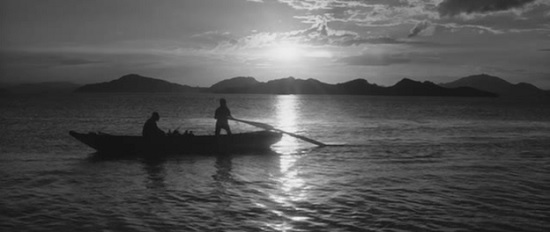
The sunrise at Naked Island
The Naked Island tells the story of a small family unit and their subsistence as the only inhabitants of an arid, sun-baked island. Daily chores, captured as a series of cyclical events, result in a hypnotizing, moving, and beautiful film harkening back to the silent era. With hardly any dialogue, Shindo combines the stark ‘Scope cinematography of Kiyoshi Kuroda with the memorable score of his constant collaborator Hikaru Hayashi, to make a unique cinematic document.
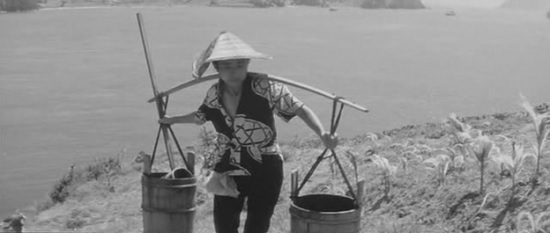
Carrying freshwater in barrels
Shindo, who had worked with both Kenji Mizoguchi and Kon Ichikawa, shot to international fame with the astounding Children of Hiroshima (1952). Eight years later, the BAFTA-nominated The Naked Island won the Grand Prix at Moscow International Film Festival (where Luchino Visconti was a jury member). It is now considered to be one of Shindo’s major works, and its success saved his film company from bankruptcy. The experience of making The Naked Island led Shindo to appreciate ‘collective film production’, and has been his preferred method of making films ever since.
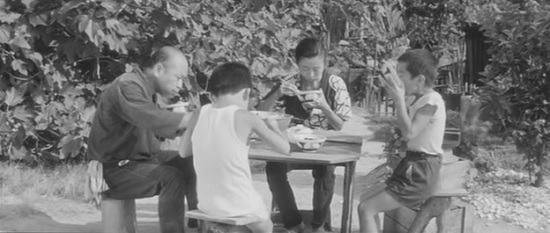
A family dinner at home in the island
Shindo's The Naked Island is a visually wondrous as it chronicles the rigorous life of a modern-day peasant family eking out their subsistence on a parched little outcropping in the middle of Japan's Inland Sea. The parents and their two sons have hours of toil to get through each day, as they have to row their boat ashore multiple times a day just to get a few buckets full of water for their crops. Each trip between their island and the harbor shore is punctuated by other tasks: tending to the crops, preparation of meals, bathing, fishing, feeding the goat, laboriously clearing the roots of trees to create a new little patch of arable soil.
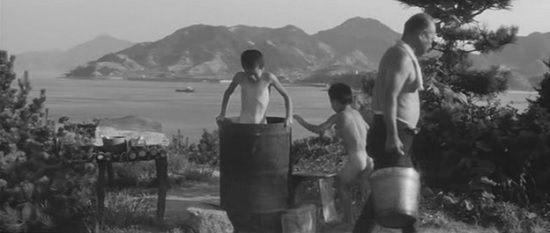
Children taking bath
During this arduous existential drama, Shindo takes us through four seasons, starting in the summer and finishing the following spring, gorgeously capturing the accompanying rituals and duties as they shift over the course of a year. This describes the repetitive cycle that befalls the small family living on Setonaikai. Their daily chores consist of fetching fresh water from the main island, making sure the children are taken to school, harvesting and any number of important jobs that they must carry out in order to get through a single day.
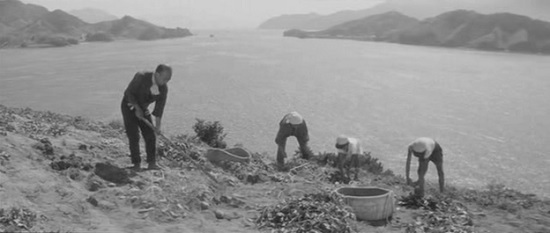
Tilling the soil for cultivation
As film opens at sunrise, we see the nearly indistinguishable silhouettes of a peasant man (Taiji Tonoyama) and woman (Nobuko Otowa) observed on the horizon as they navigate their modest rowboat through the tranquil waters. Arriving on the main island, the couple disembark from their boat carrying large water barrels and walk along a footpath towards the freshwater reservoir of a village where they fill their water barrels to capacity, before rowing their boat home to a small island, and carry the oversized vessels through the steep and irregular trail along the hillside, balancing the cumbersome, shifting weight of the water across their shoulders through precariously yielding, long wooden poles.
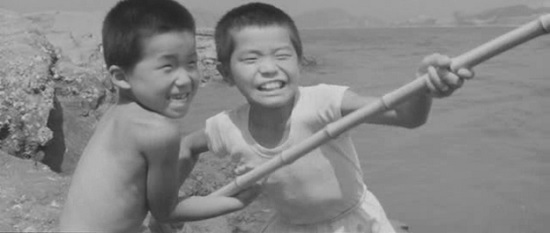
Children engaged in fishing
Observing their parents' approach from the sea, the children scamper to feed the animals, tend to the stove, and set the table so that the family meal is promptly served by the time that the adults reach the summit. After hurriedly consuming his breakfast, the older son (Shinji Tanaka) puts his bowl away inside the house, retrieves his school bag, and proceeds directly to the rowboat, where his mother soon follows carrying another set of water barrels for the next appointed excursion to the main island. And so the silent, existential ritual of the isolated family unfolds as the somber couple endlessly toil under the unforgiving sun throughout the day - alternately transporting water from the main island and cultivating the arid soil of their terraced, planting field along the side of the remote mountain island - eking out a meager existence from the barren and desolate land.
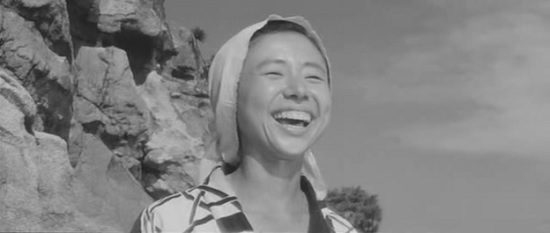
A joyful moment with children
The director illustrates these difficulties by prolonging several scenes during the course of the film; and rather than use dialogue he relies on the expressions of his actors to carry across a series of emotional events. Evocative music and naturalistic sound effects, the voices of children singing and adults chanting, keeps the film going without any lull moment. You'll either find it unbearably tedious or magnificently enthralling, and your response will largely be predicated on your ability to simply slow yourself down long enough to adjust to The Naked Island's languid rhythms.
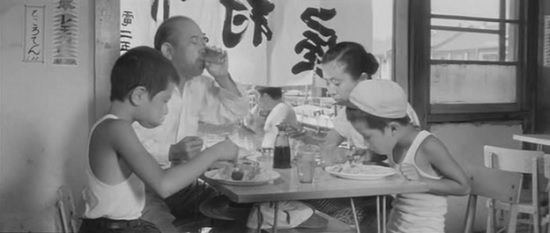
The family enjoying dinner in a city restaurant
Kaneto Shindo creates a visually distilled, minimalist, and understated, yet compelling and profoundly expressive portrait of human struggle, perseverance, and survival in Naked Island. Crafting a remarkably fluid and tightly edited film that is entirely devoid of dialogue, Shindo effectively exploits the characters' silence in order to capture an organic rhythm that, in turn, reflects the cycle and ritual of human experience: the repetition of daily tasks that begin and end in darkness; the evocative, cross-cut shots of the father watering the wilting crops as the mother arduously transports water barrels; the cadence of displaced water from a rowing oar; the allusive depiction of seasonal change through images of harvested fields, village festivals, cherry blossoms, land tilling, and crop seeding. Recalling contemporary filmmaker Robert Bresson's presentation of impassive characters, extended silences, and ambient sound, Shindo similarly evokes a sense of transcendence from an oppressive existence through the performance of manual ritual. In the end, the silently suffering inhabitants of the austere island achieve their own poetic and natural state of grace, not through overt contemplation and spiritual enlightenment, but through the humble acknowledgement of a universal sense of place and the resilient acceptance for the unknown - and unknowable - travails of human existence.
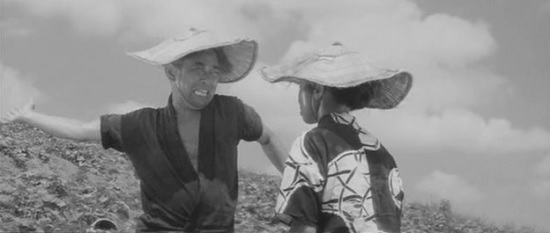
A slap for spilling water
Ordinarily repetitive scenes of the daily ritual of carrying water in barrels would be deemed as trivial, let alone showing it two or three times in succession, but this is where Shindo hammers home a harsh reality. Upon the final time in the first act as Toyo reaches the top of the hill she stumbles and spills the water, receiving a slap in the face from her husband Senta (Taiji Tonoyama). It’s a cruel payoff after the hardship she’s endured to which desperation surrounds itself. By now the very meaning of their existence begins to show: they’re merely survivors who cannot afford to make mistakes, should time and wealth refuse to be on their side. Of course it can also serve as an extension of Shindo's already widening ideas and the way in which he chooses to depict family relationships.
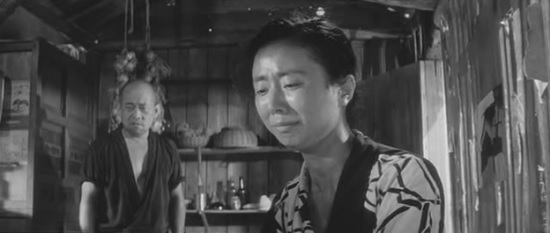
A poignant moment
The Naked Island is a beautiful film, so beautiful in fact that it almost seems impossible that Shindo managed to capture the kinds of things that he did. His composition is astonishing; showing off a busy foreground, while in the back we have the visual delights of the outer island and yonder.
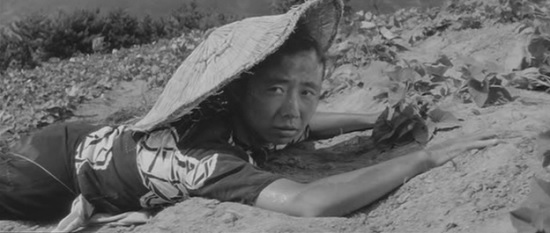
A moment of breakdown
Shindo's portrayal of a simple rustic existence is based on his own experience as a child. After all, the family could have relocated and taken on a more ordinary, less arduous type of labor to make ends meet. But it hardly requires narrative explication to make clear to the viewer that these people were born to this way life.
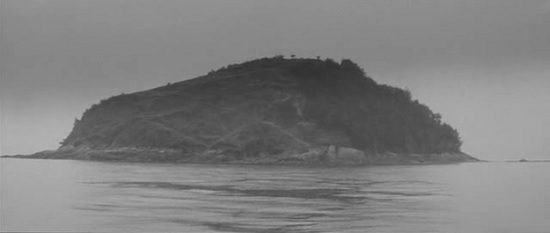
The Naked Island
Despite the inherent frustrations, the inevitable daydreams of greater comforts and the completely forgivable breakdown that one of the parents succumbs to (briefly) toward the end of the film, The Naked Island is a testimony of honor and an inspiring challenge to all of us to summon up our own courage, look within and fully inhabit the life that we're each called to live in whatever circumstances we find ourselves
A series of "Hundred Favorite Films Forever"
23-Feb-2013
More by : P. G. R. Nair